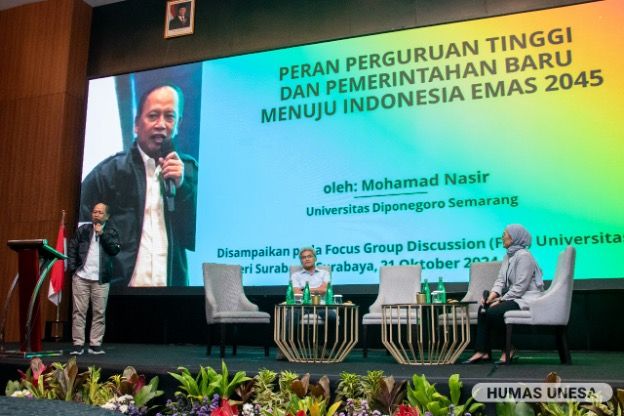UNESA FGD Discusses the Role of Universities and the New Government Toward Golden Indonesia 2045

Unesa.ac.id, SURABAYA-Universitas Negeri Surabaya (UNESA) held a Focus Group Discussion (FGD) with the theme 'The Role of Higher Education and the New Government Towards Golden Indonesia 2045' on Friday, November 8, 2024 at Whiz Luxe Hotel Surabaya.
Rector of UNESA, Nurhasan or familiarly called Cak Hasan, said that the event, which is included in the series of UNESA's 60th Anniversary, was held to discuss various challenges and opportunities for higher education in preparing superior human resources towards the Golden Indonesia 2045.
“Human resource development needs to be formulated strategically, given the challenging dynamics of future competition. The vision of human resource development through education needs to be strengthened and well orchestrated. Hopefully, there are strategies and recommendations that we produce from this discussion,” he said.
In the discussion session, Minister of Research, Technology and Higher Education, Working Cabinet (2014-2019), Mohamad Nasir said that Indonesia must prepare a superior generation or qualified Human Resources (HR) to achieve the status of a developed country and create equitable welfare.
He emphasized the importance of utilizing the demographic bonus that will soon pass, because changes in population structure are taking place rapidly. During 33 years of development, Indonesia has not managed to reach the developed country category, with GDP per capita in 2023 at US$4,919.7.
“Potential economic growth of five percent may become stagnant normal growth without innovation,” he said.
He further mentioned that Indonesia will have a big challenge in facing Industry 4.0 which changes the structure of the global value chain, and demands increased technology and innovation.

If Indonesia fails to educate a highly competitive generation, it will face risks such as getting old before rich, falling into the middle income trap, falling behind in the global value chain, and facing low economic growth. This will prevent Indonesia from achieving the vision of a prosperous developed country.
In line with this delivery, Abdul Haris, Director General of Higher Education, Research and Technology highlighted that universities play an important role towards the Golden Indonesia 2045, especially in improving quality human resources.
This is in accordance with the constitutional mandate, that higher education must contribute significantly to national development, considering that every 1% increase in the highly educated population can add 0.37% to economic growth and reduce poverty by 2%.
“However, higher education in Indonesia still faces challenges of inequality in access, quality, and relevance to the world of work,” explained the University of Indonesia (UI) professor.
The flagship program Merdeka Belajar Kampus Merdeka (MBKM) is expected to strengthen the relevance of education to market needs, while research funding is directed at increasing the competitiveness of graduates and improving the quality of universities.
The FGD was attended by experts from the ministry and various universities, as well as university leaders and faculties within UNESA.

Meanwhile, Secretary General of the Indonesian Ministry of Education and Culture for the 2019-2021 period, Ainun Na'im said that the education budget should be used as an investment to increase the Human Capital Index (HCI) and GDP per capita, which can encourage innovation and quality research.
The trends in global higher education, she added, such as digital learning, micro-credentials, and the use of artificial intelligence, are directions that Indonesia must adapt.
Technological advancements, labor market needs, and demands for sustainability and diversity are also factors that affect higher education. “Therefore, the partnership between campus and industry is expected to continue to be enhanced to ensure graduates are ready to face future challenges,” he said.
On the other hand, Rector of Bogor Agricultural University (IPB), Arif Satria, expressed concerns regarding Indonesia's food security. According to him, Indonesia is still lagging behind several neighboring countries such as Singapore, Malaysia, and Vietnam in terms of food security index.
“It is quite alarming to know that in the Food Sustainability Index, Indonesia once lost to Ethiopia,” he explained.
This shows that Indonesia still has big challenges in realizing sustainable food independence, especially in the context of climate change which continues to have a negative impact on food production. (*)
***
Reporter: Medina Azzahra (FBS), and Saputra (FBS)
Editor: @zam*
Photo: UNESA HUMAS Team
Share It On: